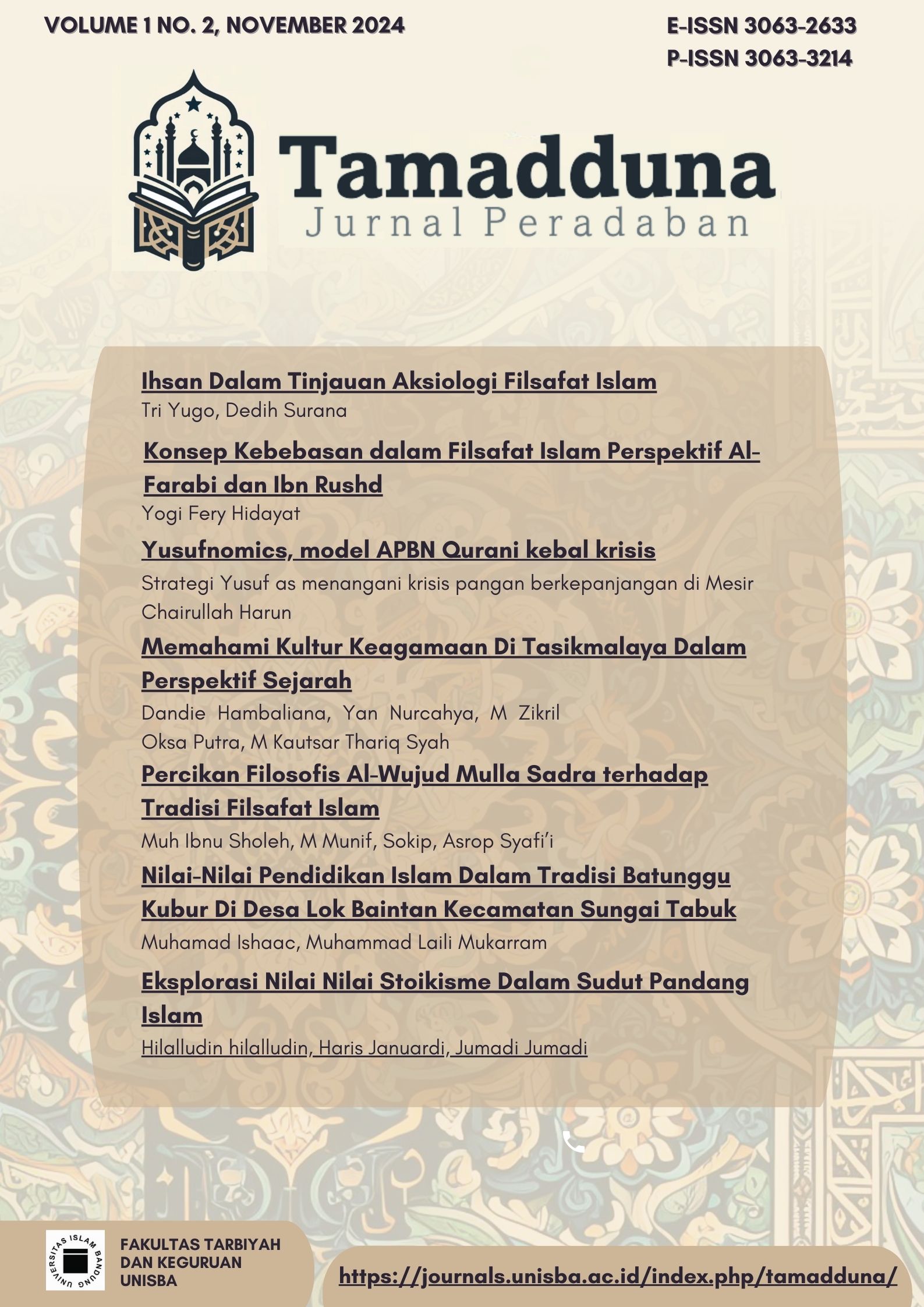Yusufnomics: Inspiration for a Crisis-Resilient State Budget Model in the Quran
The Strategy of Prophet Yusuf (Joseph) in Handling Prolonged Food Crises in Egypt versus the Policies of the Indonesian Government in Facing the 1998 Crisis
DOI:
https://doi.org/10.29313/tamadduna.v1i2.5153Keywords:
APBN, Surplus, Saving, CharacterAbstract
The government budget is a projection of government revenues and expenditures for a certain period. Government revenues consist mostly of taxes, while expenditures consist of government spending. In Indonesia, the State Revenue and Expenditure Budget, abbreviated as APBN, must be approved by the House of Representatives. The APBN is designed to ensure that the country's economy can continue to move even amidst various challenges, in order to create a prosperous, just and prosperous society. The APBN is called a Surplus if government Revenue is greater than Expenditure. The surplus becomes State Savings. The APBN is called Balanced, if government revenues are the same as expenditure. The APBN is called a deficit if government revenue is smaller than expenditure. The deficit must be covered with debt. Yusufnomic, is a simple Surplus APBN model, which has proven successful in saving Egypt from a prolonged food crisis, based on noble and strong values, namely optimizing production, the state and society saving money when prosperous, the vision and example of leaders and the determination to overcome the crisis with reserves or savings of the state and society . Yusufnomics also suggests that success really depends on the character of the leader. And as God's chosen man, Yusuf (a.s.) has steadfast faith, is visionary, firm and professional.
References
Al Quran, Surah Yusuf, ayat 1 sampai 111.
Sulaeman Jajuli, Kebijakan Fiskal Dalam Perspektif Islam (Baitul Maal Sebagai Basis Dalam Pendapatan Islam), AD-DEENAR, Jurnal Ekonomi Dan Bisnis Islam, 2017.
Mike Oktaviana, Samsul Bahry Harahap, Kebijakan Fiskal Zaman Rasulullah dan Khulafarasyidin, Institut Agama Islam Negeri (IAIN) Kerinci, Nazharat, Vol. 26 No. 01, Juni 2020
Frans Seda, Kekuasaan dan moral, politik ekonomi masyarakat Indonesia baru, Gramedia Pustaka Utama, 1996
Mohamad Khusaini, Ekonomi Publik, Universitas Brawijaya Press, 2019
Wikipedia, Government budget, June 2024
Maria Elina, Pengantar Ekonomi Pembangunan, Eureka Media Aksara, 2023
Todaro & Smith, Economic Development, 13th Edition, 2020
Amrizal, Pengantar Ekonomi Pembangunan, Sekolah Tinggi Manajemen Transportasi Trisakti, Jakarta 2006
Yonathan Setianto Hadi, Dasar-dasar praktek penyusunan APBN di Indonesia, Kementerian Keuangan Republik Indonesia, Direktorat Jenderal Anggaran, Direktorat Penyusunan APBN, Terbitan Pertama: 2013
Postur APBN Indonesia 2014, http://www.feedsia.com/2016/01/pengertian-kebijakan-fiskal-instrumen.html, 22 September 2017
Verelladevanka Adryamarthanino , Widya Lestari Ningsih, IGGI, Program Bantuan Dana untuk Indonesia di Era Orde Baru, Kompas.com, 13/12/2021.
Lokadata, Realisasi Defisit APBN-RI 2015 -2020, https://lokadata.beritagar.id
Febyana Siagian, Mengenal Apa Itu Defisit APBN, tempo.co, Rabu, 29 November 2023
Kemenkeu RI, Penggelembungan Anggaran Modus Laten Korupsi, Jakarta, 6 Maret 2007
Angga Laraspati, Bamsoet : 40% APBN/APBD Menguap oleh Korupsi, detikNews, Kamis, 09 Des 2021
Fajar Nur Alam & Farida Sari Maya, Widjoyonomics Sampai Habibienomics, FACTUM, Volume 6, N0.2, Oktober 2017
Kris Banarto , https://www.kompasiana.com, Habibienomics Vs Widjojonomics, Siapa Yang Menang ? , 21 April 2020
Lepi T. Tarmidi, Krisis Moneter Indonesia : Sebab, Dampak, Peran IMF Dan Saran, pidato pengukuhan Guru Besar Madya pada FEUI dengan judul “Krisis Moneter Tahun 1997/1998 dan Peran IMF”, Jakarta, 10 Juni 1998
Akbar Yanuar Marlen, "Peran IMF dalam Mengatasi Krisis Moneter di Indonesia", kompasiana.com, 2 Agustus 2023











